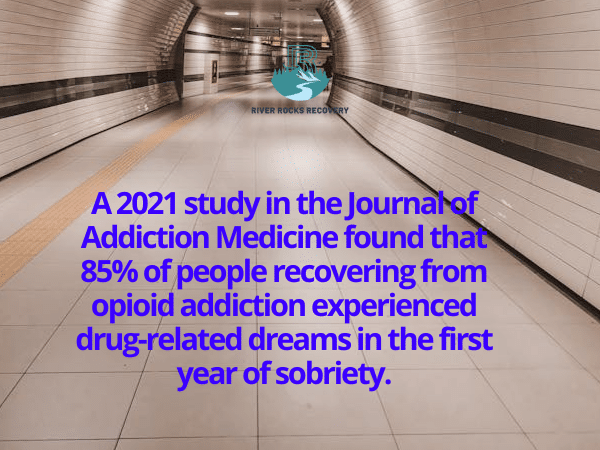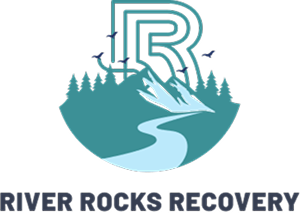Recovery from addiction is a deeply personal and transformative journey, but it often comes with unexpected challenges. One such challenge that many individuals in sobriety face is drug-related dreams, also known as using dreams. These dreams can be vivid and unsettling, leaving individuals feeling anxious, guilty, or even tempted to relapse.
If you’ve ever woken up from a dream where you were drinking or using drugs and felt confused or worried, you are not alone. Drug-related dreams are common, particularly in the early stages of recovery. But what do these dreams mean? Are they a warning sign of relapse, or are they just part of the healing process?
At River Rocks Recovery, we provide the necessary support to help individuals understand and navigate these experiences. In this blog, we’ll explore:
- What drug-related dreams are and why they occur
- The psychological and neurological reasons behind them
- How these dreams affect people in addiction recovery
- Effective coping strategies to prevent relapse
- How professional addiction treatment programs can help
Whether you are in a Partial Hospitalization Program (PHP), Intensive Outpatient Program (IOP), Outpatient Program (OP), or a Sober Living Program, learning how to handle drug-related dreams is an essential part of maintaining long-term sobriety.
What Are Drug-Related Dreams?
Drug-related dreams, often called using dreams, are dreams in which an individual who is in recovery experiences using drugs or alcohol again. These dreams are usually very vivid and realistic, and upon waking up, a person may feel emotions such as:
- Guilt or shame – Feeling like they have failed in their recovery.
- Relief – Realizing that it was just a dream.
- Cravings or urges – Experiencing a strong desire to use again.
- Confusion or anxiety – Worrying that relapse may actually happen.
Common themes in these dreams include:
- Using substances in a familiar setting (a bar, club, party, or home)
- Being pressured by old friends or acquaintances to use again
- Feeling euphoria in the dream, then regret upon waking up
- Experiencing a relapse and trying to hide it from loved ones
While these dreams may feel distressing, they are not a sign of failure. Instead, they reflect the mind’s way of processing past addiction experiences and adjusting to a new sober lifestyle.
Why Do Drug-Related Dreams Happen?
There are several reasons why individuals in recovery experience using dreams. These reasons are a combination of neurological, psychological, and emotional factors that occur as the brain adapts to life without drugs or alcohol.
1. Brain Rewiring and Neuroplasticity
During addiction, drugs and alcohol rewire the brain’s reward system, making substance use feel pleasurable and reinforcing repeated behavior. Even after quitting, the brain still retains memory traces of substance use, which can resurface in dreams.
- The dopamine system (responsible for pleasure and motivation) continues to adjust during sobriety.
- The hippocampus (involved in memory) still holds associations with past substance use.
- The amygdala (which processes emotions) may trigger dreams related to stress or cravings.
2. Emotional Triggers and Stress
Using dreams often happen after a person encounters stress, emotional challenges, or situations that remind them of their past substance use. Triggers such as:
- Arguments with loved ones
- Financial or work-related stress
- Visiting places associated with drug or alcohol use
- Seeing old friends who used substances
…can all influence dream content.
3. Fear of Relapse
Many people in recovery fear falling back into addiction, and these fears can manifest in dreams. The mind may simulate a relapse scenario, making the person more aware of their commitment to sobriety upon waking up.
4. Post-Acute Withdrawal Syndrome (PAWS)
PAWS refers to lingering withdrawal symptoms that can last for months after quitting substances. These symptoms include:
- Mood swings
- Sleep disturbances
- Depression or anxiety
- Drug-related dreams
PAWS is common in recovery from opioids, alcohol, benzodiazepines, and stimulants.
5. Unresolved Trauma and Past Experiences
For many, addiction is linked to past trauma, mental health disorders, or difficult life experiences. Using dreams may be a way for the brain to process these emotions subconsciously.
Do Drug-Related Dreams Mean You’re Going to Relapse?
No! Having a dream about using drugs or alcohol does not mean you are destined to relapse.
These dreams are actually a sign that the brain is healing and working through past experiences. However, if drug-related dreams trigger strong cravings or temptations, it’s important to seek additional support.
At River Rocks Recovery, we encourage individuals to:
- Talk about their dreams in therapy or support groups
- Recognize that dreams are not reality
- Use the experience as a learning opportunity
- Strengthen their recovery plan if cravings increase

How to Cope with Drug-Related Dreams
1. Recognize That They Are Normal
Understanding that these dreams are a common part of recovery can help reduce fear or guilt. They do not mean that sobriety is failing.
2. Talk About It
Sharing drug-related dreams with a therapist, support group, or sponsor can provide reassurance and guidance. Many people in 12-step programs discuss these experiences to help each other navigate recovery.
3. Keep a Dream Journal
Writing down drug-related dreams can help identify patterns, triggers, and emotional connections. Keeping track of:
- When the dreams happen
- What emotions were present
- Any recent stressors
…can offer insight into personal triggers.
4. Practice Stress Management Techniques
Reducing stress and anxiety can lower the frequency of drug-related dreams. Some effective techniques include:
- Mindfulness meditation
- Deep breathing exercises
- Yoga or physical exercise
- A consistent bedtime routine
5. Engage in Therapy
Therapeutic approaches like Cognitive-Behavioral Therapy (CBT) and Dialectical Behavior Therapy (DBT) help individuals:
- Manage stress and triggers
- Process past trauma
- Develop effective coping skills
6. Strengthen Your Recovery Plan
If drug-related dreams become frequent or distressing, consider adjusting your recovery plan. Participating in a structured addiction treatment program like PHP, IOP, OP, or sober living can provide additional support.
How River Rocks Recovery Can Help
At River Rocks Recovery, we provide comprehensive addiction treatment programs to help individuals cope with drug-related dreams and other recovery challenges.
Our Programs Include:
- Partial Hospitalization Program (PHP) – Intensive therapy with medical and psychological support.
- Intensive Outpatient Program (IOP) – Flexible treatment with individual and group counseling.
- Outpatient Program (OP) – Supportive therapy for long-term recovery.
- Sober Living Program – A safe, structured environment for individuals transitioning from treatment.
Each of these programs includes relapse prevention strategies, therapy, and holistic healing methods to ensure long-term success in sobriety.
Final Thoughts
Experiencing drug-related dreams in recovery can be unsettling, but they do not indicate failure, weakness, or an inevitable relapse. Instead, they are a reflection of the brain’s healing process as it rewires itself and adjusts to life without substances. While these dreams may evoke feelings of guilt, anxiety, or even cravings, they can also serve as powerful reminders of why sobriety matters.
No matter where you are in your recovery journey, you deserve a future free from addiction. If drug-related dreams are causing distress, or if you need additional support to stay on track, we’re here to help.
FAQ About Drug-Related Dreams in Recovery
What are drug-related dreams?
Drug-related dreams, also known as using dreams, are vivid dreams in which a person in recovery experiences using drugs or alcohol. These dreams can feel real and may cause anxiety, guilt, or cravings upon waking.
Why do I have dreams about using drugs or alcohol?
These dreams occur as the brain adjusts to sobriety. They can be triggered by stress, past trauma, withdrawal symptoms, or emotional triggers related to addiction. The brain is processing past substance use experiences as part of its healing process.
Are drug-related dreams a sign of relapse?
No, experiencing drug-related dreams does not mean you will relapse. They are a normal part of addiction recovery. However, if they trigger strong cravings or distress, it’s important to seek support from a therapist or addiction treatment program.
How can I stop drug-related dreams?
While you can’t completely prevent them, you can reduce their frequency by:
- Managing stress through mindfulness, meditation, and therapy.
- Keeping a consistent sleep schedule and avoiding sleep disturbances.
- Talking about them with a support group, therapist, or recovery coach.
- Keeping a dream journal to identify patterns or emotional triggers.
Do all people in recovery experience drug-related dreams?
Not everyone experiences using dreams, but they are common—especially in early recovery. Many individuals in alcohol rehab treatment and drug rehab treatment report having them, even after years of sobriety.
Should I talk to my therapist about these dreams?
Yes! Discussing drug-related dreams with a therapist or support group can provide insight, reassurance, and coping strategies. If these dreams lead to cravings or emotional distress, professional support can help.
How can River Rocks Recovery help with drug-related dreams?
At River Rocks Recovery, we offer comprehensive addiction treatment programs, including:
- Partial Hospitalization Program (PHP)
- Intensive Outpatient Program (IOP)
- Outpatient Program (OP)
- Sober Living Program

